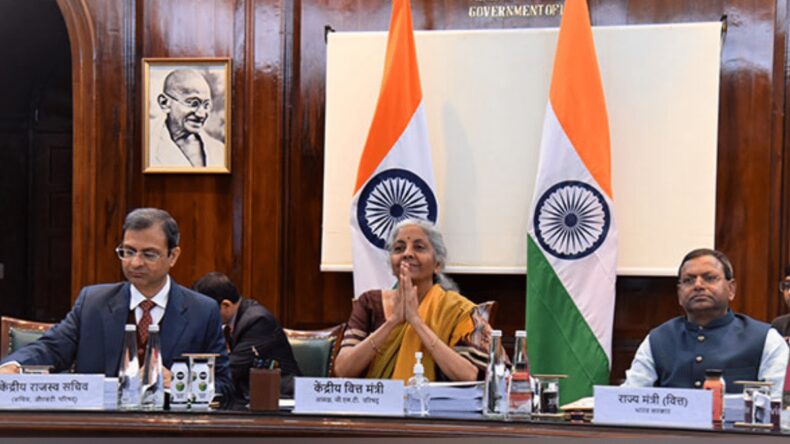Union Finance Minister Nirmala Sitharaman chaired the 49th GST Council Meeting held at Vigyan Bhavan, New Delhi.

The following matters were held as key points of focus for the meeting
All GST Compensation Dues will be Cleared.
The finance minister announced that the Centre would release GST compensation worth Rs. 33,506 to States. This compensation would come from the exchequer’s (national treasury) as the GST Compensation Cess fund currently is not equipped with adequate balance, it will be retrieved from the collections made in future.
Furthermore states like Telangana, Odisha, Karnataka, Tamil Nadu and Union Territories like Delhi and Puducherry would also be getting additional compensation.
Nil GST Rate on “Loose Rab”, 5% on Packaged Rab
Rab which is a kind of liquid jaggery which was earlier sold under an 18% GST slab, would now be free of GST when sold loose and when sold as a pre-packaged and labelled commodity would be a part of the 5% GST slab.
GST Rate on Pencil Sharpener reduced to 12% from 18%
Late Fee for Annual Returns up to 5 Crore, Rs. 25/day subject to a maximum of 0.02% of turnover. The same shall be applicable from FY 2022-2023.
The Board also approves the establishment of the Amnesty scheme for taxpayers who have failed to file three statutory returns. This would include conditional waivers or reductions in late fees.
Two reports of GOM acceptance including Special Compensation scheme for certain industries and GST Tribunal.
Slight modifications are required in report of Group of Ministers for GST Tribunal.
Discussions upon establishment of GST Appellate Tribunal has been a long one, but in this GST Council meeting the board reached a consensus for establishment of GST Tribunal to resolve any dispute concerning GST. This decision will also help in reducing burden from the judiciary especially the High courts.
GST would be applicable to Court fee by Courts and Tribunals under Reverse Charge Mechanism
In order to boost the first stage collection of the revenue the government on certain commodities like pan masala, and gutkha have decided to switch from the ad valorem (this type of tax is imposed on the monetary value of a taxed item) mode of collecting compensation cess to a specific tax (tax imposed on the basis of physical units like gallons, kgs of produce) based mode.

THE COMPOSITION AND WORKING OF GST COUNCIL MEETING
The 101st Constitutional Amendment included article 279A in the Indian Constitution, empowering the President to constitute a joint forum of the Centre and States, namely the Goods and Services Tax Council (GST COUNCIL). It is the first constitutional federal body established in our country showcasing the highest standards of competitive-cooperative federalism in its working.
The GST Council is a 33-member government body. Its members include 2 members from the Centre and out of the remaining 31 members, 28 are from the state and 3 from Union territories.
The Council contains –
1. Union Finance Minister (Chairperson)
2. Union Minister of State in charge of revenue or finance (Member)
3. Minister of States in charge of finance or taxation or other ministers as nominated by each state government (Member).
Its main function is modification, reconciliation and procurement of any law or regulations concerning goods and services tax in India. It is responsible for any modifications made in the tax slabs or particular commodity tax rates etc.
The Council takes decisions through voting. The central government has 25% of the vote and the states combined have 75% of the vote. For any decision to be finalized a minimum vote of 75% is required.












